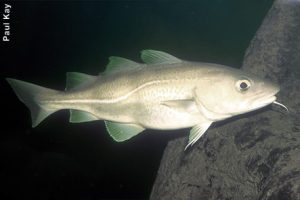 Carrie Hume is Director of Conservation & Campaigns at the Marine Conservation Society. She grew up in the seaside town of Lowestoft, with a long family legacy of entrepreneurial fisherman, who were ultimately doomed by the early-twentieth century collapse in the local fishing industry. Currently land locked in Herefordshire, a committed environmentalist, she is coming full circle back to her marine roots to help recover our great British seas.
Carrie Hume is Director of Conservation & Campaigns at the Marine Conservation Society. She grew up in the seaside town of Lowestoft, with a long family legacy of entrepreneurial fisherman, who were ultimately doomed by the early-twentieth century collapse in the local fishing industry. Currently land locked in Herefordshire, a committed environmentalist, she is coming full circle back to her marine roots to help recover our great British seas.
If you were a fish in UK waters right now, you might want to reconsider where you swam. Because according to some, after leaving the European Union we are going to have more fish and chips for British gullets. That place where you thought you could safely hide out, feed, and have your fishy ways with each other, well that might be up for grabs too. Because although we do safeguard parts of our UK seas for you through domestic site protection and other seasonal closures, the majority of this (at least via protected areas) comes from places set up through European law. And, the reason you’re generally not fished to smithereens is because we took it on the chin long ago that we needed to work with our neighbours to ensure a share that was fair and didn’t drive you to extinction. That was called the Common Fisheries Policy (CFP), and it took a while to sort it out, but we eventually got there.
There are only so many ways to divvy up the fish in the sea and only so many fish in the sea. Outside of the EU this simple conundrum remains. We could try to lure more fish our way from elsewhere, but fish rather stubbornly like it where they do and have millenia-old migrations patterns. There will be no stealing fish away that way. Maybe by protecting and restoring some of the British seabed (a habitat once as interesting as any rainforest), we could offer better places for foraging and reproduction and therefore more fish for domestic consumption. Perhaps we would also be better able to keep out foreign fleets once we’ve left the EU. A win-win?
So how would that work? We’d need to fully look after the protected areas that we’ve already established so that damage and over fishing doesn’t take place within them. We’d need to bring the sites currently
set up through the EU into domestic protection, emulating their reason for being which is ecologically sound. We have made great progress putting in good protection for many of our sites, but there is a way to go. Maybe bringing those sites into domestic protection would give us more control over what goes on in them? We already know however, that not enough of the sea is protected, even with the sites that already exist – more areas are needed to make sure fish and other marine wildlife can do all of the things they need to do in all of the right places – no point giving you a feeding larder but no sexy boudoir. So, we’d have to protect even more of the sea, and we’re obliged to do that under international obligations that have nothing to do with the EU anyway. So, safeguarded sites, fish feeding and spawning away, free from interference, and then swimming into our nets fat and happy – and your fish and chips assured! There is still a bit of a problem there. What? …..

Well there is this tricky little problem called historic rights. You fish are valuable, and correspondingly many nations have secured rights to fish in other parts of the world and in some cases these rights go back hundreds of years. There exist somewhat ancient, but still entirely legal laws of the sea that precede the CFP and allow other nations to fish in our waters. And, we Brits in our great exploration of the seas also secured similar rights. Many of our current rights are set out in and negotiated through the CFP. We leave the CFP, and those rights need to be negotiated all over again. Do you think our bargaining position is strong? So Mr Cod, Haddock and your friends, it’s not going to be as easy as some might think. We might well end up with something a few years down the line that looks and feels a lot like the CFP. But in some ways that’s a distraction from the real issue of marine ecosystem collapse. Maybe we can instead have something that performs the same function as the CFP in terms of assuring sustainable fish stocks, but which also facilitates and further crystallises the need for a transformation of the marine environment in our domestic waters. This is so dearly needed and would put us on a world leading platform.
[registration_form]
I wan’t to see a huge yellowfin tuna population in the north sea and the herring shoals of the past.
There were once hundreds of square miles of big juicy scallops in UK waters. I want those back especially.
Gerard – since you are clearly not old enough to have seen them in the past I do hope that you are young enough to see them in the future.
Protected areas aren’t just there to ‘not be overfished’. They need to rebuild habitats and species populations. A little fishing removes a lot of vulnerable species, so a lot of protection is needed to bring them back. That means – in essence – that the only protected areas that make much difference are those that are highly or fully protected from fishing. The science is clear on this point. That said, those protected areas contribute in many ways to fisheries in surrounding areas. So conservation and fishing are compatible – just not in the same places.
Hey – we should talk some more.
Hi Callum, just wanted to say how enlightening I found your book “The Unnatural History of the Sea.”
All excellent and beautifully written prose. The section on shifting baselines really brings home the magnitude of the problem.
Left me feeling so depressed about what we have done to the oceans.
Hopefully though we can start to turn things around before it is too late for future generations.
Many thanks,
Steve
Callum – many thanks for your comment – and welcome to this blog. Fancy writing a guest blog yourself?
What a superbly well written and interesting post. That’s the thing about this blog – the balance between the familiar subjects and the not so familiar, so that you learn something new every day reading it. I really can’t praise it highly enough.
Shameless flattery aside, re. “we’d have to protect even more of the sea, and we’re obliged to do that under international obligations that have nothing to do with the EU anyway.” Along with the value of obligations comes the value of effective enforcement. One of the EU’s advantages is that the Commission has seemed to have real teeth* if member states fail to fulfill objectives laid down by Directives – it can issue significant fines for example (even if cases may tend to take an age to go through the process). This is where I think it acted as a check and balance to national governments pursuing bad policy. Is the enforcement of other international objectives as effective – are there bodies that can issue sanctions for example? Who gets involved if not the EU, the UN?
* Failed to think of a fish related pun there, sorry…
Thanks for the flattery MK. I cod definitely do with thinking this through – I can only think of one incidence in which non-EU derived ramifications were brought into play and I’m not sure even then that the threat of repurcussions was actually followed through. We do have some domestic sticks, but they vary in their efficacy and some are just plain not yet tested. Let’s hope our Ministers keep their eye on the ball…
https://www.theguardian.com/environment/2012/apr/02/eu-fishing-west-africa-mauritania
Thanks for the interesting blog. What’s the current situation re EU fishing fleets exploiting West African waters? I bet there are no EU conservation or policing initiatives being carried out down there.
Hi – I’m not sure, but it’d be very interesting to find out.
We have had some really useless fisheries ministers in the past. One that comes to mind is Ben Bradshaw. Iceland has taken the correct approach. I’m old enough to remember the 3 cod wars in the late 50s, late 60s and mid-70s. Keep everyone out beyond 200 miles like Iceland. Their seas and rivers are very healthy. However, as a non-EU country, our surrounding waters will no longer contain that huge chunk to the west of Ireland. This doesn’t really give us much that will be ‘ours only’. Rising sea temperatures will push good eating fish further north e.g. cod, haddock and hake (if the Spanish haven’t cleared out the Irish Box). Still, it will stop French and Spanish vessels sneaking into the sea lochs on the west of Scotland and stripping them of haddock.
If only there were plenty more fish in the sea for everyone. I think we buggered that up a long time ago though. You reckon we can keep out the French and Spanish vessels and we won’t be equally ejected from some other fishing grounds ourselves?
Geoff – welcome to this blog. And they beat us – speaking as an Englishman – at football too, so we have a lot to learn from the Icelanders.
Perhaps when we leave the EU they will no longer want to buy the majority of the fish and shellfish caught in British waters. This may create some financial problems for the larger scale UK fishermen, but after all they are the ones doing most damage
Dave Cooling – welcome to this blog.